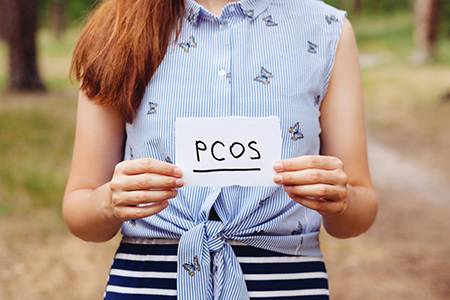 It’s estimated as many as one in 10 women are affected by polycystic ovary syndrome, or PCOS. This common women’s health condition can start in the teenage years. However, many women aren’t diagnosed until their childbearing years—when they start trying to have a baby.
It’s estimated as many as one in 10 women are affected by polycystic ovary syndrome, or PCOS. This common women’s health condition can start in the teenage years. However, many women aren’t diagnosed until their childbearing years—when they start trying to have a baby.
A small level of androgens, or male hormones, in your body is normal. But, with PCOS, your body makes too much. Women with PCOS also often have high levels of insulin. These imbalances cause several different symptoms and increase your risk for other conditions. That’s why it’s important to know the signs of PCOS and how it can affect your overall health.
Multiple ovarian cysts
An ovarian cyst is a fluid-filled sac on your ovary. Small ovarian cysts are common in all women who ovulate—even those who don’t have PCOS. But these harmless cysts typically go away on their own. PCOS gets its name because most of the women with the condition have multiple cysts present on their ovaries. However, some women may have PCOS without these cysts.
Irregular periods
The hormone imbalances caused by PCOS often lead to irregular periods. Many women are first diagnosed with the condition after they visit their OB GYN because of this concern. If you have PCOS, the U.S. Department of Health and Human Services says you may frequently miss your period or have bleeding but no ovulation. It’s also possible to completely stop having periods, which is known as amenorrhea.
Infertility
The lack of ovulation or irregular ovulation associated with PCOS can make it harder to get pregnant. In fact, the PCOS Awareness Association says that PCOS is the most common cause of female infertility today. The good news is that—with the right treatment—many women with the condition go on to conceive and have a healthy pregnancy.
Skin and hair changes
Several skin and hair changes can be symptoms of PCOS. The Office on Women’s Health says the condition causes abnormal hair growth on the face, chin, or other parts of the body in 70% of women. It can cause thinning hair on the scalp. If you have PCOS, you may also have persistent acne, dark patches on the skin, or skin tags.
Mental well-being
Several mental health conditions tend to be more likely when you have PCOS. The reason for this link is still being studied. However, women with PCOS should be aware of their risk and not be afraid to seek out care. According to a study published in the medical journal Endocrine, PCOS was associated with an increased risk for conditions like depression, anxiety, bipolar disorder, and obsessive-compulsive disorder.
Cardiovascular health
PCOS can affect your cardiovascular health in many ways. It makes you more likely to have high blood pressure, high “bad” LDL cholesterol, and low “good” HDL cholesterol. Overall, the Centers for Disease Control and Prevention says women with PCOS have an increased risk of heart disease, and, like all women, this risk increases as they age.
Diabetes
Because women with PCOS are often insulin resistant, diabetes is a common health concern. According to the Endocrine Society, a study showed that those with PCOS were four times as likely to be diagnosed with Type 2 diabetes. If you have PCOS and are considering pregnancy, it’s also important to know you may have an increased risk of gestational diabetes.
Get support for PCOS
PCOS affects your body in many ways. As a result, the right treatment for you depends on your symptoms, other health conditions, and your health goals. For example, if you have PCOS and are trying to have a baby, consider visiting an OB GYN who is board certified in reproductive endocrinology and infertility to get specialized care.
Your OB GYN can help you navigate your care options and recommend other resources related to heart, diabetes, skin, or mental health. With a complete plan, you can find relief from symptoms and reduce your risk for other health conditions.
